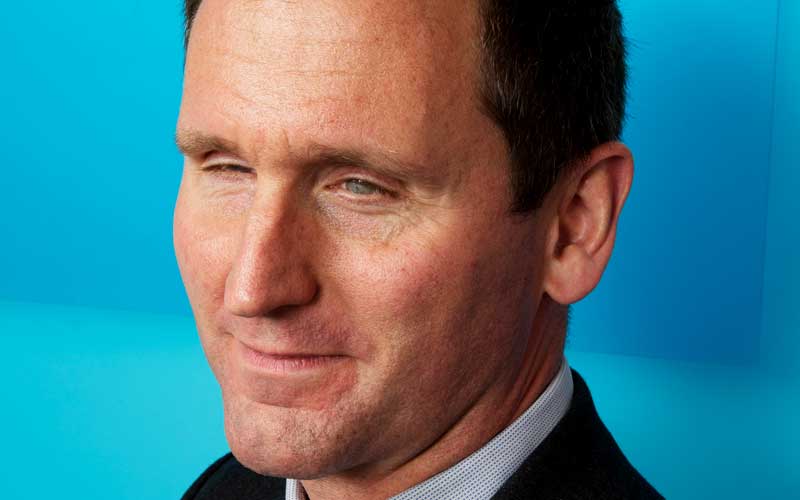By Raya Al Jadir
A Paralympic goalball star has lost his legal case against a council that switched off the traffic lights in a busy shopping area – in order to create a “shared space” street design – leaving him and other blind and visually-impaired people unable to cross the road.
Simon Goodall, who represented ParalympicsGB at London 2012, argued that the decision by Reading council to turn off the lights in January 2015 had placed him and other disabled people at risk.
He had appealed to the high court this week against its refusal to order a judicial review of the council’s decision, but his appeal was rejected.
The courtroom had been packed with guide dog-users and other visually-impaired people, some of whom had travelled from Scotland.
Goodall’s bid to force the council to think again over the road layout in the centre of Reading had received backing from disability organisations including Berkshire Disabled People Against Cuts (DPAC), Berkshire Guide Dogs for the Blind, Berkshire Vision, Reading Mencap, Reading Arthritis Matters and a representative of Age UK, who all combined to produce a leaflet detailing their concerns.
The court hearing was attended by Lord [Chris] Holmes, himself a blind retired Paralympian and now disability commissioner for the Equality and Human Rights Commission.
Lord Holmes (pictured) has previously called for “an immediate moratorium on all shared space” and has described such projects as “dangerous and costly planning follies” that are turning town centres into “dangerous third world traffic free-for-alls”.
He has accused “overzealous councils” of “risking public safety for aesthetics”, leading to “confusion, chaos, unnecessary cost and catastrophe”.
Although Goodall lost this case, he is now likely to take a disability discrimination case against Reading council in the county court for failing to make a reasonable adjustment to allow him to access services in the centre of Reading.
Shared space designs usually remove kerbs, road markings and traffic lights so pedestrians and motorists and cyclists have to make eye contact to establish right of way, but blind and partially-sighted people like Goodall and Lord Holmes argue that this risks their safety.
In Reading, the council switched off the lights at the junction of St Mary’s Butts, West Street, Broad Street and Oxford Road, but later installed a pedestrian crossing nearby in Oxford Road.
Goodall’s lawyer, Chris Fry, of discrimination law experts Unity Law – which last July produced a legal guide to shared spaces – said the court’s decision was “really alarming”, while he said Goodall was “very disappointed”.
He said the court had decided that the council had met its public sector equality duty under the Equality Act by simply considering the impact of its decision on disabled people.
Fry said that councillors had accompanied blind and visually-impaired people on a site visit last year but had ended up having to help them across the road because they weren’t able to cross independently and safely.
He said the court could have taken the view that the case was of “a wider social importance” and so should have been allowed to go to a full trial so it could be explored in more depth.
He said: “The fact that they didn’t and relied on a procedural way out is a full cop-out for me and one which everyone in the court-room felt was a disappointing outcome.”
Marry Cross, founder of Berkshire DPAC, said the court’s decision was “a real slap in the face”.
She set up a petition that secured more than 2,000 signatures, asking for the traffic lights to be switched back on, but she said the council “wouldn’t listen to the argument that people were losing their independence”.
She said: “Blind people now have nothing to tell them when it is safe to cross, as the lights used to have a special tactile signal for them as well as the beeps.
“Deaf people can’t look in all directions at once and people with learning difficulties have little or no chance of understanding when it is safe to cross.
“Those of us who are slow because of mobility impairments or just old age, find it very frightening because the area of road you have to cross is so wide.”
Cross added: “Most disabled people I know and many elderly people have told me they don’t go into town anymore because they don’t feel safe.”
Tony Page, Reading council’s lead member for strategic environment, planning and transport, said in a statement: “The council notes today’s judgement which confirms the previous high court decision from March this year, refusing the applicant permission to apply for judicial review.
“If the applicant wishes to appeal today’s judgment to the court of appeal, he has seven days in which to do so.
“The council does not intend to comment further until that seven-day time period has expired.”

 Baroness Grey-Thompson runs out of time in the Lords as she lists access barriers faced by disabled people
Baroness Grey-Thompson runs out of time in the Lords as she lists access barriers faced by disabled people  Laws on self-driving vehicles risk creating new access barriers, disabled peers warn
Laws on self-driving vehicles risk creating new access barriers, disabled peers warn UN day of disabled people: Cycling benefit fears, public appointments review, and a new ODI network
UN day of disabled people: Cycling benefit fears, public appointments review, and a new ODI network